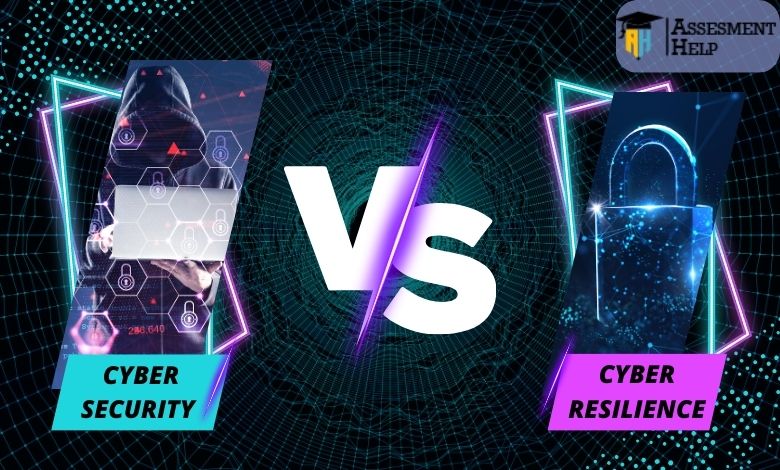Cyber Security vs. Cyber Resilience: What’s the Difference?

In today’s increasingly digital world, protecting your digital assets and information is more critical than ever. Two terms that often come up in discussions about safeguarding against cyber threats are “Cyber Security” Vs. “Cyber Resilience.” While they share the goal of defending against cyberattacks, they have different focuses and approaches. This article will dive into the distinctions between Cyber Security and Cyber Resilience, shedding light on their unique roles in maintaining the integrity and continuity of digital operations.
Understanding Cybersecurity
What is Cybersecurity?
Cybersecurity, in the realm of computer science assessment help, pertains to the proactive measures taken to safeguard computer systems, networks, and digital data from unauthorized access, theft, or potential damage. This multifaceted discipline encompasses an array of strategies geared towards thwarting cyber threats, which may include viruses, malware, and unauthorized intrusions.
Importance of Cybersecurity
The significance of cybersecurity cannot be overstated. It is vital for safeguarding sensitive data, financial assets, and ensuring the uninterrupted operation of businesses and critical infrastructure.
Key Elements of Cybersecurity
Key elements of cybersecurity include firewalls, encryption, antivirus software, and regular system updates. These tools and practices are designed to thwart cyberattacks.
The Concept of Cyber Resilience
Defining Cyber Resilience
Cyber resilience, on the other hand, is a broader approach. It involves not only preventing cyber threats but also focuses on an organization’s ability to adapt and recover from cyber incidents swiftly.
The Role of Cyber Resilience in Modern Businesses
In the realm of online computer science assessment help, businesses are confronted with an unceasing deluge of digital threats. Cyber resilience is a strategic approach that recognizes the inevitability of breaches, even when robust prevention measures are in place. Its primary objective is to mitigate the repercussions of such incidents and facilitate a swift return to regular operations.
Cyber Security vs. Cyber Resilience
Different Approaches
Cybersecurity primarily focuses on prevention. It creates barriers and employs preventive measures to keep threats at bay. Cyber resilience, on the other hand, prepares for the possibility of a breach and aims to minimize the damage.
Their Goals and Objectives
The goal of cybersecurity is to prevent attacks from happening. In contrast, cyber resilience aims to ensure the continuity of operations even when an attack occurs.
Complementary Nature
These two concepts are not mutually exclusive; rather, they complement each other. Cyber resilience is often seen as an extension of cybersecurity, filling in the gaps left by preventive measures.
Key Differences Between Cyber Security and Cyber Resilience : Assessment Helper
Scope and Focus
Cybersecurity’s primary focus is on protecting against known threats, whereas cyber resilience focuses on the ability to respond effectively to both known and unknown threats.
Proactive vs. Reactive
Cybersecurity is a proactive approach, whereas cyber resilience is reactive to an extent, focusing on recovery and adaptation after a cyber incident.
Adaptability and Recovery
Cyber resilience emphasizes adaptability and the ability to recover from disruptions swiftly, while cybersecurity concentrates on preventing those disruptions in the first place.
Importance of Combining Both
While these two concepts have different priorities, they are not substitutes for each other. A comprehensive digital defense strategy should include elements of both cybersecurity and cyber resilience.
Cyber Security Measures
CS measures include but are not limited to:
- Network Security
- Endpoint Security
- Data Encryption
- Access Control
- Threat Detection
Cyber Resilience Strategies
CR strategies encompass:
- Regular Data Backups
- Incident Response Plans
- Employee Training
- Redundancy in Systems
- Continuous Monitoring
Real-World Examples
To illustrate the importance of both Cyber Security and Cyber Resilience, consider the 2017 Equifax data breach. While the breach itself highlighted weaknesses in their Cyber Security measures, their lack of Cyber Resilience meant that they struggled to recover swiftly, causing significant damage to their reputation.
Challenges in Implementing Cyber Resilience
Implementing cyber resilience can be challenging. It requires significant planning, investment, and a cultural shift within an organization.
Building a Robust Cybersecurity Strategy
To ensure your organization’s digital safety, you should:
Identifying Vulnerabilities
Regularly assess your digital infrastructure for vulnerabilities and address them promptly.
Developing Incident Response Plans
Have a clear plan in place for how to respond to cyber incidents to minimize their impact.
Employee Training
Train your employees to recognize and respond to potential threats. They play a critical role in your organization’s cybersecurity.
Conclusion
In summary, within the scope of assessment help in Australia, Cyber Security and Cyber Resilience emerge as interconnected elements of the digital defense landscape. These two facets, although distinct in purpose, harmoniously coexist and strengthen each other. The synergy between a robust Cyber Security framework and a meticulously designed Cyber Resilience strategy forms the linchpin for protecting your digital assets within the continuously evolving threat landscape.
FAQs
1. Can Cyber Security and Cyber Resilience replace each other?
No, they cannot. Both are essential in their own right, and a comprehensive security strategy should incorporate elements of both Cyber Security and Cyber Resilience.
2. What are the key differences between Cyber Security and Cyber Resilience?
Cyber Security is about preventing attacks, while Cyber Resilience focuses on recovery and maintaining operations during and after an attack.
3. How can I enhance my organization’s Cyber Resilience?
You can enhance your Cyber Resilience by implementing incident response plans, regular data backups, employee training, and system redundancy.
4. Are small businesses equally vulnerable to cyber threats?
Yes, small businesses are also at risk of cyber threats. Implementing Cyber Security and Cyber Resilience measures is crucial for businesses of all sizes.
5. Are there any industry-specific considerations for Cyber Security and Cyber Resilience?
Yes, different industries may have unique requirements and threats. It’s important to tailor your approach to your specific industry’s needs.
In this age of constant technological advancements and digital threats, understanding the distinctions between cybersecurity and cyber resilience is vital. These concepts work in tandem to provide a comprehensive defense against cyber threats. By implementing the right strategies and being prepared for potential incidents, individuals and organizations can navigate the digital landscape with confidence.
You Can Also Read:- How Risk Assessments Revolutionize Business Continuity and Disaster Preparedness



